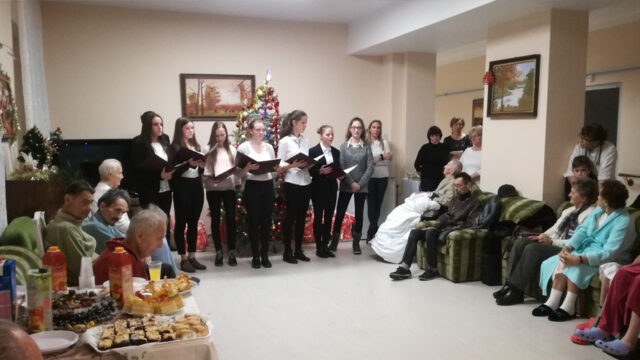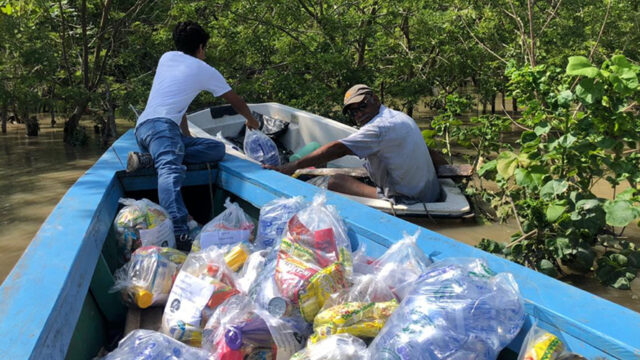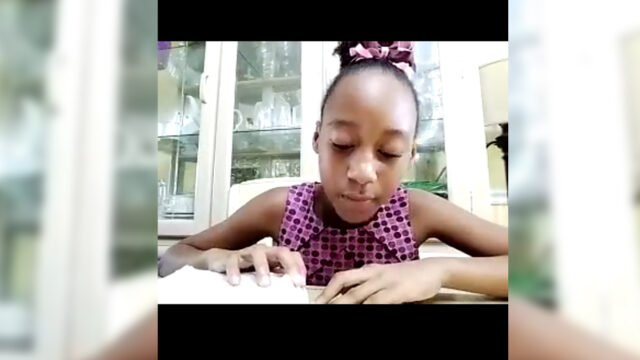A trek of unsettling self-discovery

I don’t think Mom will make it through the night.” My sister sounded tired over the phone. Mom had started to fall more frequently, and now she lay in the hospital with a head injury and significant internal bleeding. Home felt suddenly far away. I threw a suitcase on the bed while my son looked online for a ticket from Boise, Idaho, to Cape Town, South Africa. Three hours later I headed to the airport, praying I’d make it in time to say goodbye. It’s not easy living far from home.
We roller-coastered our way through the next few days: four daughters from the four corners of the globe gathered around a hospital bed, trying hard to figure out what to do with Mom. Sometimes she was with us, but we often watched her struggle to understand why we were all there. It broke our hearts when she begged us to take her home.
A DIFFICULT DECISION
A week later, two of my sisters returned to their families, and I stayed to help transition Mom from the rehab facility to a frail-care center. Her progress was slow, and when her doctor recommended she stay longer in rehab, I decided to delay my return. At the same time, the COVID-19 pandemic began to rapidly wrap itself around the globe. Europe had become the new hot spot, surpassing China, but all indications showed a high probability of additional hotspots springing up everywhere.
My son called from Washington, D.C., anxious for my return and concerned I’d be stranded if I postponed my flight. Things started to feel surreal, and my heart tore over my longing for home. How do you choose when home is found in two places? In the end I decided to return stateside. With only days left in South Africa, I spent time with Mom, walked the beaches, went to dinner with a friend, and finished packing up Mom’s apartment.
Two days before my departure, South African president Cyril Ramaphosa declared a national state of disaster and shut down 35 ports of entry. Other African countries immediately followed suit, and foreign consulates contacted their citizens, urging them to return home. As I said goodbye to my mom, the European Commission announced that the European Union would soon close its borders to all nonessential travel. Caught up in the crisis with my mom, I had remained unaware of these developments.
THE JOURNEY BEGINS
At Cape Town International Airport pandemonium broke out, with expatriates and tourists desperate to find a flight out. As I weighed my bags at the Lufthansa check-in counter, I discovered my connection in Frankfurt had been canceled. I had no choice but to board for Europe, not knowing what I’d do once I reached Germany.
By the time I touched down in Frankfurt, the European Union had activated the order from the European Commission, and in an unprecedented move had shut its borders to most of the outside world. We disembarked in silence. As I stepped off the plane, an armed police officer took my passport and directed me to stand with all the other non-German residents. I held my breath and pulled out my phone, anxious to see if I had any messages. There it was—my son had found a connecting flight and rerouted my flight through Chicago to Boise. I felt weak with relief.
Someone called my name, and I stepped forward to show proof of my connection and was waved through. A few minutes later I was stopped again. This time five armed police officers formed a human barrier to the entrance of the airport. An anxious knot of travelers stood in front of them as one of the officers exclaimed, “I’ve told you five times already! The border is closed! Europe is shut down! What don’t you understand?” I inched forward and held out my phone, and he let me pass.
Beyond the checkpoint the airport appeared deserted. The silence felt eerie. The line at the service desk moved slowly as strangers shared their stories, their voices low and tight with stress. A young mother repeatedly poured sanitizer on her daughter’s hands. I reached the counter and gratefully received my boarding passes. As I walked to my gate I finally started to breathe again. Twenty hours later I arrived in Boise just before midnight, limp with exhaustion.
WHEN LIFE HITS LIKE A FREIGHT TRAIN
It’s hard to process life when it comes at you like a freight train. But with the shelter-in-place order in effect, I’ve had time to reflect. The crises with my mother and the COVID-19 pandemic have coalesced, and, to be honest, they’ve left me struggling. I’ve spent days with my mind in some fuzzy, not-fully-present place grappling to understand everything going on around me and within me.
I keep telling myself to snap out of it. But how do you get back to normal when nothing is normal anymore? I’m tired of the noise, the memes, the social media games. I’m wearied by all the cheery posts that tell me to “keep it positive.” I’m disheartened by the posts saying God’s tired of us fighting, so He’s sent us to our rooms. I’m alarmed by the posts claiming that this is all a hoax.
Soon after arriving stateside, my son and daughter-in-law were diagnosed with the coronavirus. I spent my nights praying them through each hour. Just keep them breathing, Lord! I felt helpless and hopeless, obsessively tracking all the stats on the pandemic. I lost my sense of peace and struggled to find calm. I ached for rest. I longed for home.
A REALITY CHECK
Sometime during the darkest night, when my children were at their worst, I remembered standing in line at the Lufthansa service desk in Frankfurt. A sweet grandma from Florida stood in front of me, and we chatted like old friends. After a pause she looked at me and said, “It all comes down to putting our trust in the Lord, doesn’t it?” We smiled in recognition as fellow believers.
But now her question came back to haunt me. As I lay silently in the dark, it cracked me wide open and laid bare my heart. I’m horrified to realize that in this double-headed crisis, I choked. I trusted the Lord in theory, but in reality I found myself paralyzed by fear, immobilized by the unknown, and silenced by my inability to control the outcome. I’m not as strong as I’d believed. My faith somehow got swallowed up in my weakness. I now see myself as I truly am: wretched, miserable, poor, blind, and naked before God and myself.
In my imagination I picture the look on Peter’s face the moment he faced a similar recognition. The crow of the rooster still echoes in predawn darkness as Jesus turns to look at him. With that look Peter’s heart cracks wide open. In the crisis Peter choked too. Like me, he wasn’t as faithful as he imagined he’d be.
Later, just before He returned home to heaven, Jesus made breakfast on the beach for His disciples. He had a question for Peter, and of all the questions He could have posed, Jesus simply asks, “Peter, do you love Me?”
Did you notice He didn’t ask, “Peter, do you know that I love you?” That’s because, from God’s perspective, His love is never in question. His love is constant. Dependable. Unchanging. Eternal. It never wavers or falters. God’s love for us is unfailing. It always has been, and it always will be.
When we’re pressed down with trouble, when we’re depressed by life and stressed by difficulties, God’s love surrounds us. He’s tenderhearted and compassionate. There’s no one who could ever love us the way Jesus loves us.
KNOWING HIS VOICE
Each time Peter answered Jesus’ question, Jesus responded, “Take care of My lambs.”
For three and a half years, Peter had been shepherded by the Good Shepherd. He had walked with Him in green pastures; had drunk of the Living Water from quiet streams; and now the Good Shepherd was restoring his soul. Jesus was renewing Peter’s strength, because in the coming years Peter would need to know that even when he walked the darkest valleys, he would never walk them alone. The One who promised to walk beside him had gone before him. “I am the good shepherd,” Jesus said. “The good shepherd gives His life for the sheep” (John 10:11).
“My sheep recognize my voice, and I know them, and they follow me. I give them eternal life and they shall never perish. No one shall snatch them away from me, for my Father has given them to me, and he is more powerful than anyone else, so no one can kidnap them from me” (John 10:27-29, TLB).¹
The road home always takes us through the valley. Jesus knows it’s not easy living so far from home. And while our hearts long for home, His heart longs, even more, for us to be home.
Sometimes it takes a crisis to crack us wide open so we can see and know our heart, to know its true state; and it’s seldom pretty. Let’s face it—we’re all struggling. We’re all exhausted. We’re all groping our way through the darkness of this valley desperate to hear the voice of our Shepherd.
Here’s what our Good Shepherd says to us now:
“Are you tired? Worn out? Burned out on religion? Come to me. Get away with me and you’ll recover your life. I’ll show you how to take a real rest. Walk with me and work with me—watch how I do it. Learn the unforced rhythms of grace. I won’t lay anything heavy or ill-fitting on you. Keep company with me and you’ll learn to live freely and lightly” (Matt. 11:28-30, Message).²
We will all make it home safely if we listen for, and follow, the voice of our Shepherd.
¹ Verses marked TLB are taken from The Living Bible, copyright
© 1971 by Tyndale House Publishers, Wheaton, Ill. Used by permission.
² Texts credited to Message are from The Message. Copyright © 1993, 1994, 1995, 1996, 2000, 2001, 2002. Used by permission of NavPress Publishing Group.








